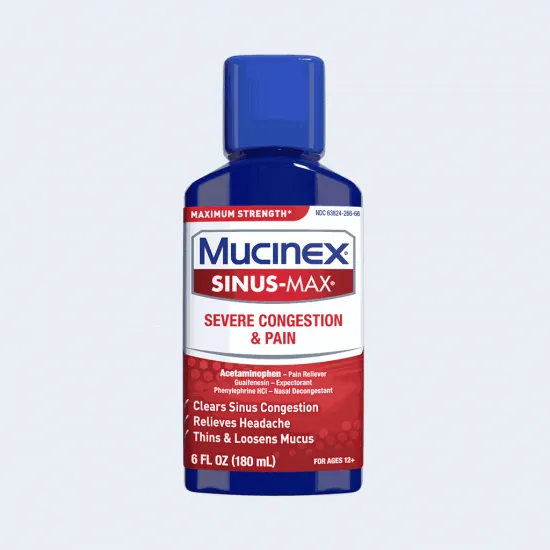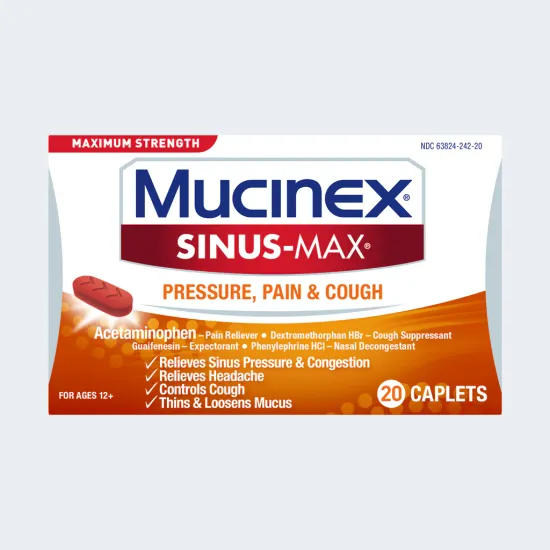
Tips for Relieving Sinus Pressure
Shop the article


21 MAR 2024
Sinus pressure is common, but nonetheless uncomfortable. Allergies and infections such as the cold or flu cause the passages in your nose to become blocked. This leads to inflammation and often throbbing pain in the front of your head and face. Luckily, there's a lot you can do to find symptom relief, allowing you to breathe easier and with less ache. Here are some tips for relieving sinus pressure when you are suffering from this uncomfortable symptom.
Moisture
Dryness in your sinus passages can cause and worsen sinus pressure. Humidifiers and vaporizers help resolve this by adding moisture to the air you breathe in, creating a more humid environment in your nose and sinuses. This can be especially helpful during winter months or if you live in a dry climate. Humidifiers typically release cool mist into the air, while vaporizers create steam from boiling water. Follow product instructions to avoid adding too much moisture to the air.
Staying Hydrated
Drinking plenty of fluids allows your body to better lubricate the linings of your passages too. Water is your best bet, but hydration can come in forms other than drinking water, such as broth-based soups, ice cubes, popsicles, and electrolyte drinks. For particularly soothing options with the added perks of steam, have chicken or vegetable soup or sip tea with honey.
Steam Up the Shower
To reap the benefits of a vaporizer or humidifier without extra equipment, savor a hot shower. Take slow, deep breaths in the shower, then linger in the bathroom afterward to continue steaming a bit longer.
You can also lean your face over a bowl of hot water and breathe in the steam to relieve sinus pressure. Aim for 10 minutes of steaming continually, two to four times per day. Make sure any water you use to steam is not too hot to prevent skin irritation or burning.
Over-the-Counter Medicine for Sinus Pressure Symptoms
Over-the-counter medications known as nasal decongestants and expectorants can help relieve sinus pain and pressure. Decongestants work by minimizing the swelling of blood vessels inside of your nose and nasal passages to help open your airways, while expectorants thin and loosen the mucus, clearing the pathway for breathing and making throat-clearing more efficient.
Some decongestant products contain pseudoephedrine, which isn't suitable for everyone because it can raise blood pressure and interfere with sleep. Always check the active ingredients on OTC medications, follow proper dosing, and contact a health professional if you have any questions.
When you're seeking sinus pressure relief, Maximum Strength Mucinex® Sinus-Max® Pressure, Pain & Cough Caplets are here to help. This maximum strength formula is designed to provide comprehensive multi-symptom relief for both day and night, so you can regain your comfort and get back to your life.
When severe sinus congestion and the accompanying pain strike, you need a solution that works fast to alleviate your symptoms. Maximum Strength Mucinex® Sinus-Max® Severe Congestion & Pain Liquid is here to provide you with temporary daytime or nighttime relief from your severe sinus and nasal congestion symptoms in one liquid dose.
Relax
Relaxation techniques can help to manage sinus pressure, especially if your symptoms include a headache. Breathing deeply, meditating, or other relaxing activities such as yoga or guided imagery may help with headache relief when suffering from sinus pressure. Biofeedback can also help by allowing you to better control muscle tension. It typically involves warming your hands along with slow breathing, focusing on feelings of warmth in different areas of your body, and picturing positive images.
Get Quality Rest
Sleeping peacefully can be challenging when you're experiencing sinus pressure, but it's also important for healing. Avoid caffeine, alcohol, and stimulating activities (such as using your computer before bed), and sleep in a dark, cool room. Stick to non-stimulating beverages later in the day as well, such as chamomile tea, which has a relaxing effect.
When sinus pressure strikes, you don't have to endure the discomfort alone. These tips offer you a roadmap to relief, helping you breathe easier and get back to your daily routine. Remember the importance of moisture through humidifiers, staying hydrated, and utilizing steam for quick relief.
Over-the-counter options can provide targeted assistance but always follow dosage instructions. If you're seeking comprehensive relief, consider Mucinex® products designed to address various symptoms, day and night.
With these strategies at your disposal, you can combat sinus pressure effectively, regain your comfort, and enjoy a more comfortable recovery. Don't let sinus pressure hold you back—take control of your symptoms today.
Resources
- Healthline (2021), How to Choose and Use a Humidifier for Sinusitis
- Cleveland Clinic (2021), The Best Foods to Eat When You’re Sick
- Allina Health (2021), Ten home remedies to relieve sinus pain and pressure
- WebMD (2022), Overview of Biofeedback
- NIH National Library of Medicine (2011), Chamomile: A herbal medicine of the past with bright future
- Saint Lukes (2023), Self Care for Sinusitis
- NHS (2023), Decongestants
